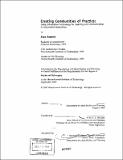Creating communities of practice : using information technology for learning and communication in automobile dealerships
Author(s)
Beamish, Anne
DownloadFull printable version (18.16Mb)
Other Contributors
Massachusetts Institute of Technology. Dept. of Urban Studies and Planning.
Advisor
William J. Mitchell.
Terms of use
Metadata
Show full item recordAbstract
The Ford Motor Company, like many other firms, is concerned with maintaining their competitive advantage in a rapidly changing and somewhat unpredictable business environment. One way of dealing with this new environment is to use information technology to create and support communities of practice-a group that constantly shares knowledge and information. Ford already has Fordstar, a private satellite system for delivering training programs to its dealerships, but would like to expand its use and take advantage of other information and communication technology to increase learning and communication. Dearborn, however, perceives the dealerships as being rather lukewarm in their enthusiasm for information technology (IT). This research shows that there are many problems and obstacles to using IT to create and support communities of practice, but in this particular case, the problems do not lie with the individual dealership employees. These individuals are not modern-day Luddites or acting irrationally. In fact, the dealerships are reacting in a quite reasonable way given the circumstances of their work environment. It is the structure of the industry, business practices, work environment, and culture, rather than the individual, that conspire against creating communities of practice or increased use of IT for learning and communication. The study also demonstrates that dealership employees are not a monolithic group. Technicians, parts employees, service advisors and salespeople all work under different conditions, and consequently react to information technology, learning, and communication in quite different ways. The overall lesson gained from this study is that in order to use information technology to create and support learning and communication within an organization, a very subtle and fine grained understanding of the workplace and its social, technical, economic, organizational and physical environment is required. Only with a thorough understanding of the work practices and environment can technology and policies be crafted to suit the needs and attitudes of a specific community.
Description
Thesis (Ph.D.)--Massachusetts Institute of Technology, Dept. of Urban Studies and Planning, 2000. Includes bibliographical references (leaves 202-213).
Date issued
2000Department
Massachusetts Institute of Technology. Department of Urban Studies and PlanningPublisher
Massachusetts Institute of Technology
Keywords
Urban Studies and Planning.